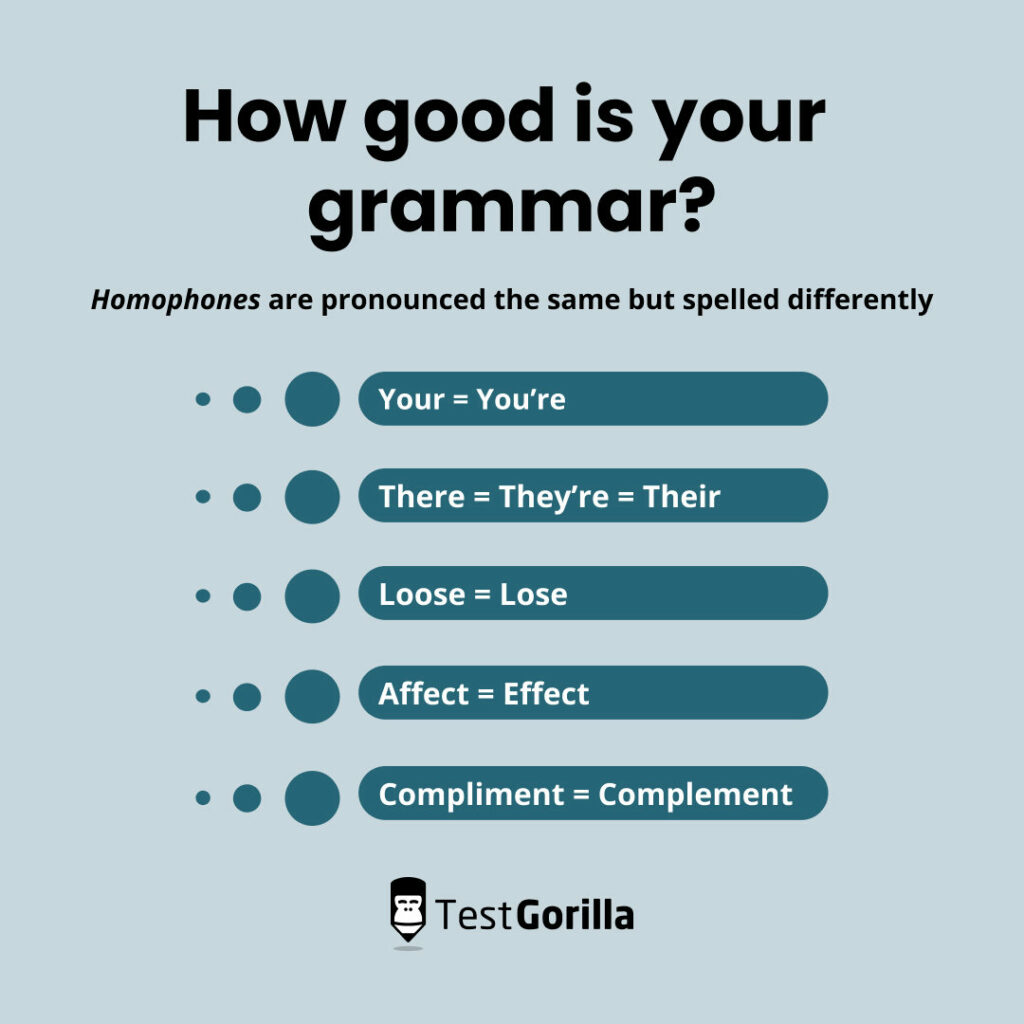All employees should have good basic grammar skills to write professional and effective communication on behalf of your organization. And for those working in a communications-focused role, excellent grammar skills are a priority.
In this article, we take a look at why grammar skills are important in the workplace and how you can use pre-employment testing to find employees with the best grammar skills for the job.
Table of contents
What is a grammar skills assessment?
A grammar skills assessment evaluates a job candidate’s knowledge of and ability to apply grammar rules in a certain language.
These assessments test candidates on specific skills like correct use of tenses, word types (verbs, adverbs, adjectives, etc.), punctuation, passive vs. active voice, and idioms.
The level of grammar skills a candidate requires depends on the nature of the role.
For example, a copywriter or communications director may require an extensive technical command of grammar to ensure they can effectively communicate on behalf of the organization.
In comparison, basic grammar skills may be sufficient for a landscaping assistant or salesperson who mainly communicates via internal emails or chat messages.
Grammar skills assessments typically employ a range of questions, including:
Multiple choice
Fill-in-the-blank
Composition tasks (requiring candidates to write sentences or paragraphs correctly)
Corrections
Sentence diagramming (explaining how each part of the sentence works)
You can administer grammar skills assessments for candidates online, which is convenient for both your candidates and your organization.
In this article, we take a look at how you can use online assessments to help you find the best person for your role.
Why are grammar skills important?
Good grammar skills are non-negotiable for roles where writing is a core function, like for PR officers, copywriters, and editors.
But a basic understanding of grammar rules is necessary for almost every profession, as all employees produce some form of written communication – emails, manuals, white papers, social media posts, letters to clients, and reports, to name a few.
So, there are several reasons why your employees and candidates need to have a good grasp of grammar rules.
Gives a good first impression
Error-free writing is essential for making a good first impression. Written communication is often the first contact a client, customer, partner, or supplier has with your business.
The recipient of your communication may judge your business based on any mistakes. Customers may even be reluctant to buy from a company with a website riddled with grammatical errors, as it represents a lack of care and attention.
Good grammar reassures the recipient that they can feel confident working with your business.
Ensures effective communication
Employees with good grammar skills can communicate effectively, clearly, and precisely, saving your business time and money.
Poor grammar can result in miscommunications or misunderstandings, creating delays. In those instances, the recipient must take extra time to clarify the meaning of a message or seek further information from your team.
Reflects a level of professionalism
Your employees reflect your company brand and values so it’s important their writing skills uphold a level of professionalism. This helps you build not only your brand but also your credibility.
If an employee’s writing contains lots of grammatical mistakes, it can make it challenging for customers, clients, partners, and suppliers to deal with your business and they might question whether to continue the business relationship.
For example, corporate social media posts musn’t contain any errors. Even small mistakes can undermine the level of skill and service your organization can offer clients and customers.
Saves time and money
If you hire employees with poor grammar skills, their colleagues or supervisors may need to oversee or proofread their written work before it’s sent out. This can be time-consuming and distracting for these employees.
Finding candidates with the necessary grammar skills also means you don’t have to conduct further training once they’re hired to bring their grammar skills up to speed, saving you money.
Indicates attention to detail
Employees with good grammar skills naturally have a high level of attention to detail, which may be a sign of the way they approach their work more broadly.
Correct grammar usage also suggests a candidate takes pride in their work and is more likely to produce high-quality work. Poor grammar, on the other hand, may point to a candidate that takes a rushed or haphazard approach to their work.
What grammar skills and traits are important for employees?
Sentence structure
To communicate effectively in the workplace, employees should understand the different elements of a sentence and how to use them in the correct order. These include verbs, adverbs, adjectives, nouns, prepositions, subjects, objects, and clauses.
Depending on their role, employees may need to know how to write simple, compound, complex, or compound-complex sentences. Understanding these foundations helps employees communicate effectively.
Passive vs. active voice
When using the active voice, the subject of the sentence performs an action. In comparison, when using the passive voice, the subject receives the action.
For example, “ABC Company prioritizes customer service and value” uses the active voice, whereas “Customer service and value is prioritized by ABC Company” uses the passive voice.
Most of the time in business writing, it’s important to use the active voice. It’s more direct and clear, and it also makes writing more engaging to the reader.
Pronouns
Pronouns are words that can replace proper nouns – for example, I, you, he, she, they, etc.
Using pronouns makes writing more concise and natural-sounding. For example, rather than saying “Vera is our marketing director. Vera is passionate about communication”, you can say, “Vera is our marketing director. She is passionate about communicating with customers.”
Linking verbs
Verbs usually describe an action in the sentence. Linking verbs, however, describe the state of the subject.
“Be”, “seems”, and “looks” are common linking verbs, for example, “She is the CEO of the company” or “The market looks like it is moving in an upward direction.”
Grammar rules state that linking verbs cannot be followed by a full clause. An understanding of the rules around linking clauses means candidates can produce more complex, descriptive sentences.
Subject-verb agreement
Verbs must agree with the number, person, or gender of the subject of the sentence. For example, in English, the verb “be” in the present tense changes depending on the subject – ”I am”, “you are”, “she is”, etc.
For effective and error-free communication, employees need to know and apply the correct subject-verb agreement rules.
Homophones
Homophones are words that are pronounced the same but spelled differently. Some common examples from English include:
Your, you’re
There, they’re, their
Loose and lose
Affect and effect
Compliment and complement
Making these errors in written communication can reflect poorly on your business so it’s essential to test candidates’ awareness of them.
Possessive apostrophe
The position of an apostrophe can change the meaning of a sentence. For example, “all of the candidate’s results were strong” refers to one candidate while “all of the candidates’ results were strong” refers to multiple candidates.
It’s important to understand the correct placement of a possessive apostrophe for clarity and to avoid misunderstandings.
Skills and traits tests
TestGorilla offers a range of grammar and vocabulary tests across 13 languages. These tests follow the Common European Framework of Reference (CEFR) for Languages.
1. English (elementary/A2 to proficient/C2)
These tests assess candidates’ English language skills, including grammar and vocabulary. You can use them to measure the full spectrum of skill levels: from elementary right up to proficient.
2. Arabic (intermediate/B1 and proficient/C1)
With TestGorilla’s Arabic tests, you can test candidates’ proficiency to communicate in everyday work scenarios (intermediate) and more high-level professional conversations (proficient).
3. Japanese (intermediate/B1 and proficient/C1)
These tests assess candidates’ abilities to use Japanese to communicate in the workplace at an intermediate and advanced level.
4. Dutch (intermediate/B1 and proficient/C1)
If you require your candidates to speak Dutch, you can use these tests to gauge their ability to communicate in day-to-day situations (intermediate) and more challenging workplace scenarios (proficient).
5. Mandarin (intermediate/B1 and proficient/C1)
Mandarin is the second most widely spoken language in the world after English. You can use these tests to assess candidates’ ability to communicate and use correct grammar at an intermediate and proficient level.
6. Russian (intermediate/B1)
TestGorilla’s intermediate Russian test lets you assess candidates’ ability to communicate in Russian during common professional situations.
7. Arabic (intermediate/B1 and proficient/C1)
You can use these tests to assess candidates’ Arabic skills, including grammar and spelling. There are two levels of tests available: intermediate and proficient.
8. Norwegian (intermediate/B1 and proficient/C1)
Use these tests to measure candidates’ communication skills in Norwegian. The intermediate test helps you identify candidates who can communicate effectively in everyday workplace situations. The proficient test determines those candidates who can handle more challenging communication in the workplace.
9. Swedish (intermediate/B1 and proficient/C1)
These tests evaluate candidates’ ability to communicate professionally in Swedish at an intermediate and proficient level.
10. Spanish (intermediate/B1, upper intermediate/B2, and proficient/C1)
These tests assess candidates’ Spanish proficiency, ranging from intermediate to proficient levels.
11. Polish (intermediate/B1 and proficient/C1)
TestGorilla’s Polish tests help you gauge potential employees’ ability to communicate in common workplace situations (intermediate) as well as high-level scenarios (proficient).
12. French (intermediate/B1, upper intermediate/B2, and proficient/C1)
You can use these tests to assess candidates’ abilities to communicate in French in straightforward daily work situations (intermediate), specialized topics (upper intermediate), or more complex interactions (proficient).
13. German (intermediate/B1 and proficient/C1)
These tests gauge candidates’ proficiency with the German language, including grammar, spelling, and vocabulary. You can use these tests for both intermediate and advanced levels.
TestGorilla also offers tests for several abilities that can provide further insights into candidates’ grammar skills.
14. Attention to detail
Candidates with sharp grammar skills require sharp attention to detail. This helps them apply the right rules to all possible scenarios and spot any errors in their writing.
You can use TestGorilla’s Attention to Detail test to see how well candidates can check the consistency of information and compare differences between statements.
15. Communication skills
Good grammar skills enhance candidates’ overall written communication. Our Communication Skills test is a useful tool for gaining a picture of candidates’ broader professional communication abilities and style.
This test provides further insights into your candidates’ written communication, including their grammar abilities and professional communication etiquette.
16. Time management
TestGorilla’s Time Management test is a great way to gauge candidates’ planning, prioritization, execution, reflection, and communication skills. These indicate candidates’ abilities to manage their time and juggle competing deadlines successfully.
17. Role-specific writing tests
Communication skills can look very different depending on the role, so it’s important to test your candidates’ writing and grammar skills in a specific context.
The Legal Research and Writing and SEO Copywriting tests offer insights into candidates’ written communication skills in these roles.
How TestGorilla can help you find employees with the right grammar skills
At TestGorilla, we understand how important it is to find candidates with strong grammar skills. We offer a wide range of tests to help you assess candidates’ language abilities in any one of 13 languages.
Whether you’re looking for someone with basic grammar skills or a comprehensive grasp of a language, our user-friendly platform makes it easy to create and send out assessments in minutes, meaning you can find the perfect person quickly.
Using pre-employment testing to assess candidates’ grammar skills is a surefire way to improve your hires and your organization’s communication – all in one go!
To see how TestGorilla can help you to hire candidates with the right level of grammar skills, try our free 30-minute live demo.
Related posts
Hire the best candidates with TestGorilla
Create pre-employment assessments in minutes to screen candidates, save time, and hire the best talent.
Latest posts
The best advice in pre-employment testing, in your inbox.
No spam. Unsubscribe at any time.

Hire the best. No bias. No stress.
Our screening tests identify the best candidates and make your hiring decisions faster, easier, and bias-free.
Free resources
This checklist covers key features you should look for when choosing a skills testing platform
This resource will help you develop an onboarding checklist for new hires.
How to assess your candidates' attention to detail.
Learn how to get human resources certified through HRCI or SHRM.
Learn how you can improve the level of talent at your company.
Learn how CapitalT reduced hiring bias with online skills assessments.
Learn how to make the resume process more efficient and more effective.
Improve your hiring strategy with these 7 critical recruitment metrics.
Learn how Sukhi decreased time spent reviewing resumes by 83%!
Hire more efficiently with these hacks that 99% of recruiters aren't using.
Make a business case for diversity and inclusion initiatives with this data.


















